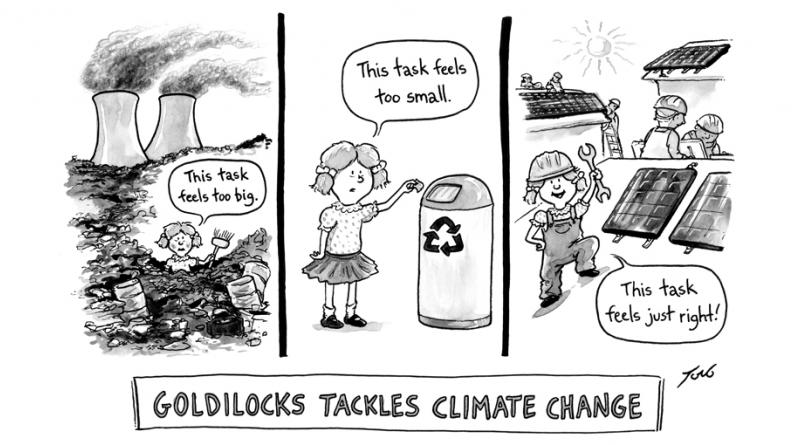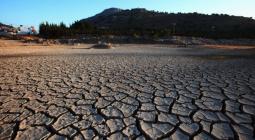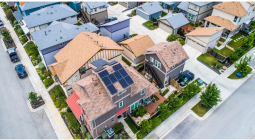ASK SARA: 'What can I realistically do about climate change?'

The past few months have shown that individuals have an absolutely gobsmackingly critical role to play in confronting a global crisis.
Hi Sara,
I was born in 1988, which apparently makes me an older millennial. My question is, what changes can I make and realistically recommend to contribute to fighting climate change? I already vote conscientiously, I’ve moved closer to my office — reducing my commute. I can’t afford a new electric car, I don’t own my own home where I can install solar panels. I’m largely vegetarian. I recycle and compost dutifully.
I feel like I do most of the things that are supposed to be helping, but short of giving up the gains I’ve made since surviving the Great Recession along with the rest of my cohort and chaining myself to a pipeline, I don’t feel like I can make a difference.
What can a young professional in Seattle do to stop desertification in sub-Saharan Africa?
– Millennial in Seattle
Dear Sara,
My personal experience dating back over a decade is that too often, progressive climate change champions have no problem describing the scientific trends regarding climate change, but when I shift the conversation to what their and my personal response to this crisis would be there is a deafening silence followed by a condemnation of political leadership. This trend was repeated twice for me this week, most recently with a dinner. When I asked my beloved family how climate concerns had impacted their personal decisions regarding personal retirement investments, travel decisions, personal expenditures, etc., these concerns were diverted as insignificant. Are they? I feel that I, too, have failed to develop a personal action plan to address climate issues. What is the responsibility of the individual beyond political action? Where can I find guidance or wisdom on this issue?
– Wondering in New England
Dear Millennial and Wondering,
I confess that I have procrastinated in answering your messages. They arrived in my inbox months ago, long before the COVID-19 pandemic, but I put off answering you because, to be honest, your questions are difficult to answer.
In the past, when I’ve given public talks (remember public talks?), I’ve advised audiences to consider the limitations of individual action. Like your friends and relatives, Wondering in New England, I’ve argued that reducing heat-trapping carbon pollution at the scale and speed that experts tell us is necessary requires a society-wide change. Changes at that scale are the work of governments and corporations, not individuals.
I’ve never been satisfied with this answer, though. It doesn’t give people much to work with. What are you, a regular person, supposed to do if your government leaders and corporate titans don’t act in time to avert widespread suffering?
The COVID-19 pandemic illuminates that problem all too well. Unless you’re a high-ranking government official, you don’t have the power to issue (or rescind) a shelter-in-place order, for example. Nor may you coordinate the purchase of medical supplies across state lines, require factories to produce testing supplies, or hand out checks to citizens.
And yet.
The past few months have shown that people like you and me have an absolutely gobsmackingly critical role to play in confronting a crisis. Most of us are staying home if our jobs and family situations make that possible, trying to remain at least six feet apart from others when human interaction is unavoidable, wearing cloth masks, and washing our hands. It is isolating and frightening work, but billions of us are participating in this breathtaking moment of global solidarity. We can’t control the disease without it.
The pandemic has also highlighted another way of looking at the tired old argument about whether individuals, governments, or companies are most responsible for cleaning up a mess of planetary proportions.
I don’t know about you, but my social media feeds are full of women (and a few men) organizing mask sew-a-thons. My neighbors are sharing extra toilet paper rolls, tomato seedlings, and soup with each other. We’re swapping tips on how to lovingly bully our friends and family members into staying at home. A restaurant owner in my town even organized local restaurateurs and farmers to offer a three-times-a-week drive-through where residents can have meals and fresh produce loaded into their trunks.
In other words, we’re finding a middle path. We’re caring for one another not just through our individual behavior but at a community scale.
The same idea applies to the problem of climate change.
Millennial in Seattle, you’re worried that actions such as voting conscientiously, reducing your meat consumption, composting, and so on are inadequate. But you feel that trying to chain yourself to a pipeline would require too much sacrifice.
And Wondering in New England, you’re hungry to create a personal action plan to address climate change.
I encourage both of you to look to the middle path.
Turn your gaze away from your own household, toward your neighborhood, school, workplace, or place of worship. Seek out others in your community who are also worried about climate change. You’re likely to discover an existing group or organization that would welcome your help.
Your work might look like organizing a solar installation at your church, talking with your neighbors about a disaster safety plan, providing legal support for people practicing civil disobedience, writing letters to the editor, lobbying your member of Congress, speaking at a utility board meeting, participating in a digital protest, or (one day, when it’s safe again) holding a sign at an in-person rally. Or something else that your community needs and you are able to provide. Whatever it is, it will be more tangible and easier to grab onto than an overwhelming problem such as “fundamentally alter U.S. politics.” But it will also feel more meaningful than composting alone.
As author Max Brooks said of the COVID-19 pandemic on a recent CBS Sunday Morning news segment, “In times of crisis, everyone has a part to play. You cannot just live your life for you. You are part of a whole, you’re part of a community, and you must do your part.”
All my best,
– Sara
YALE CLIMATE CONNECTIONS



